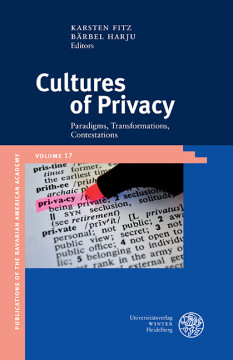
BUCH
Cultures of Privacy
Paradigms, Transformations, Contestations
Herausgeber: Fitz, Karsten | Harju, Bärbel
Publikationen der Bayerischen Amerika-Akademie / Publications of the Bavarian American Academy, Bd. 17
2016
Zusätzliche Informationen
Bibliografische Daten
Abstract
America has been hailed as the land of personal freedom, where the rights of the single citizen reign over the demands and expectations of the masses. Yet freedom of choice and the premium placed on private property also necessitated a counter force, a submission to authority, and pre-established patterns of behavior. And it led to a highly ambivalent notion of privacy, as an individual right situated between apparent opposites – private freedom and public order, liberalism and authoritarianism, (individual) autonomy and (communal) collectivity. ‘Cultures of Privacy – Paradigms, Transformations, Contestations’ addresses the nation’s struggles to harmonize these opposites, to reconcile the private and the public, both in a historical and comparative, transnational perspective. Individual contributions take issue with the staggering transformations of the public/private dichotomy, with the alleged erosion of privacy in the political arena, the “right to be let alone” in US legal culture, and the ambiguous hyperemphasis on the private in the media and in popular and literary culture (as in confessional blogs, social networks, and memoirs).
Inhaltsverzeichnis
| Zwischenüberschrift | Seite | Aktion | Preis |
|---|---|---|---|
| Cover | C | ||
| Title Page | iii | ||
| Copyright | iv | ||
| Preface | v | ||
| Table of Contents | vii | ||
| Framing the Discourse | ix | ||
| Karsten FITZ and Bärbel HARJU, Cultures of Privacy: An Introduction | 1 | ||
| David VINCENT, Privacy and Surveillance in the Nineteenth Century | 15 | ||
| Cultural Memory | 33 | ||
| Erika DOSS, Public Feeling, Public Healing: Contemporary Memorials and the Mediation of Grief | 35 | ||
| Klara Stephanie SZLEZÁK, A Twice-Told Tale: The Multiple Recreations of Hawthorne’s. Private Life at Concord, Massachusetts | 57 | ||
| Space | 75 | ||
| Steven HOELSCHER and Trushna PAREKH, Making Space Public in an American City | 77 | ||
| Bärbel HARJU, Privacy Crisis: Architecture, Suburbia, and Postwar America | 95 | ||
| Politics | 115 | ||
| Karsten FITZ, ‘Privatizing’ the White House: American Presidents and the Visual Aesthetics of Privacy | 117 | ||
| Christine HEINKE (née Weiss), Hillary & Bill, Jackie & Jack, Michelle & Barack – A Public Love: US American First Ladies in the Limelight | 143 | ||
| Law | 165 | ||
| Ari Ezra WALDMAN, Privacy as Trust | 167 | ||
| Birgit WETZEL-SAHM, Negotiating the Right to Be Let Alone: The Constitutional Right to Privacy and the Cultural Practice of the US Supreme Court | 187 | ||
| Katja KANZLER, Privacy, Professionalism, and the Female Lawyer: Intimate Publicness in The Good Wife | 209 | ||
| Technology | 225 | ||
| Sebastian HAUNSS, Privacy Activism after Snowden: Advocacy Networks or Protest | 227 | ||
| Giorgia Tommasi, Technology and Privacy: A Narrative Perspective | 245 | ||
| Sidonie SMITH and Julia WATSON, Getting or Losing a Life? Privacy, “Transparency,” and Self-Presentation Online | 259 | ||
| Coda | 273 | ||
| J. Jesse RAMÍREZ, Contemporary Cultures of Privacy, or, Rethinking the “Privacy Panic”: Shopping, Sexting, Surveillance, Copyright | 275 | ||
| Notes on Contributors | 289 |


 Publishing Platform by CloudPublish
Publishing Platform by CloudPublish